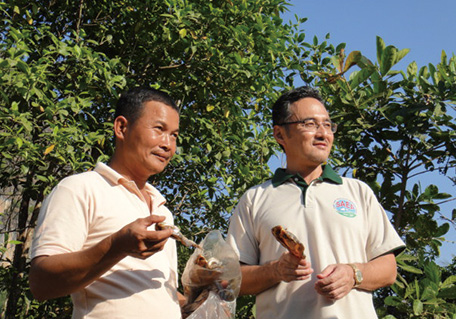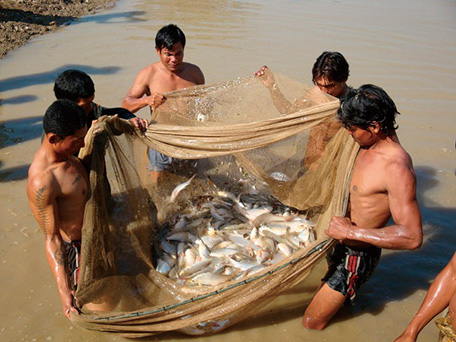Japan's Official Development Assistance White Paper 2012
Stories from the field 1
Fish Culture in Rice Fields Improves Livelihood of Rural Community
– Small-Scale Aquaculture Extension Project in Myanmar –

Department of Fisheries personnel with Mr. Takahashi making the rounds. In his hand is a fried fish harvested by a villager. (Photo: Shingo Takahashi)
Myanmar was ruled by a military regime following the collapse of the socialist government in 1988, but democratization has progressed under President Thein Sein, who was inaugurated in March 2011. One person who has continued to engage in the development of rural areas in Myanmar is JICA technical cooperation project expert Shingo Takahashi. Mr. Takahashi is a fisheries industry expert who has provided guidance on fisheries development in Cambodia and several African nations. He was assigned to Myanmar in 2005 as a JICA Advisor on Fishing Development Policy to determine what sort of cooperation was possible there. "The military regime officially maintained the stance that Myanmar had no poverty," Mr. Takahashi recalled. "It was difficult to even get out to rural areas at the outset."
Farmers make up 80% of Myanmar's population. In general, they live a self-sufficient life and have little cash income. Freshwater fish are a vital source of protein, but increased demand and overfishing in recent years has caused concern over dwindling catches of natural fish. This moved JICA to launch the Small-scale Aquaculture Extension Project for Promotion of Livelihood of Rural Communities in Myanmar in five municipal zones in the southern delta region of Myanmar in June 2009.
This project aims to enhance farmers' livelihoods with a small investment by way of raising freshwater fish in small ponds and paddies in their villages. Fish cultivated in paddies increase rice harvests by eating insects that are harmful to the rice plants, agitating the soil and providing organic fertilizer through their waste. Farmers eat the fish they produce and can sell any extra fish in the villages to generate cash income. Because of their past experience under the long rule of a military regime, people who live in rural areas of Myanmar do not believe what the government says so easily. They do, however, deeply trust Japanese people in Myanmar. Mr. Takahashi was successful in winning the villagers' trust in this project by visiting the villages together with counterparts from the Department of Fisheries.

Villagers enjoying harvesting aquaculture fish, a new source of cash income (Photo: Shingo Takahashi)
Under the project, fish culture has been undertaken on a small-scale at village ponds and school ponds in villages. Villagers manage the ponds on their own with regular monitoring and supervisions of the project. The rainy season starts in May in Myanmar, and ponds and paddies are filled naturally with rainwater. Aquaculture begins when water has been stored up. A 10-gram fry will grow into a 400-gram fish in 10 months. As the impacts of small-scale aquaculture are being recognized gradually, the number of villagers who come forward to participate in the project has been increasing steadily. Very motivated farmers have been identified as "core farmers" and are entrusted with producing fish seeds that will grow into fish. Core farmers will take roles to supply the fish seeds and to disseminate technical information to other villagers. This system helps to spread independent small-scale aquaculture in villages.
Unfortunately, the project faced one problem after another at the outset. A sudden change in the weather brought on a deluge that swept away all the fries that had been released into water the previous day. Paddies overflowed when dams upstream released water without warning. The project stalled because aquaculture and rice cultivation were handled by different administrative bodies. Despite the outrageous turns of events, the people of Myanmar helped Mr. Takahashi stay enthusiastic. "I think, at the heart of it, people at the Department of Fisheries want to do something to help their country," he said. "I want to give it my best after seeing how serious and sincere they are. Also, villagers treat us like family. This country is full of such warm feelings."
Mr. Takahashi's hard work is beginning to pay off - villagers have begun to show initiative and come up with their own ways to work at aquaculture. He is looking forward to the day when they confidently tell him what to do. He has also heard requests from neighboring villages that they also want to try small-scale aquaculture.
"People in this country still value the mutual dependence that brings people together," Mr. Takahashi said. "That value will inevitably change with development. What is important is a good balance. I do not think it is a good thing just to develop quickly. That is precisely why we need a form of development like small-scale aquaculture to raise the farmers' standard of living little by little." Myanmar continues to undergo rapid democratization and have an open door policy toward foreign capital and aid. Mr. Takahashi earnestly hopes that Myanmar can develop while holding onto the positive attributes of a pious, Buddhist nation.
